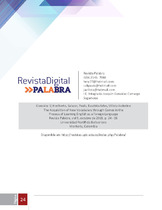The Acquisition of New Vocabulary through Games in the Process of Learning English as a Foreign Language

View/
Date
2018xmlui.dri2xhtml.METS-1.0.item-type
article
Citación
Metadata
Show full item recordDocuments PDF
Abstract
This research aimed to evaluate the effectiveness of games as a useful strategy to promote students´ language proficiency. Researchers thought that students seemed to learn new vocabulary faster and retain it better when applied in a relaxed, comfortable environment, for instance, when they are playing games. They also confirmed that the use of games in class helped students to obtain and to retain new vocabulary in a more efficient way rather than using the traditional methods, like grammar translation or just memorizing. The quantitative method was used in the process of observing and collecting data through open interviews to teachers, and surveys to students. Sixteen students formed two groups, divided in an experimental and a non-experimental group, they both took a pretest and a posttest. As a result, the experimental research group succeeded in the scores overcoming the non-experimental research group demonstrating that the use of games is a pedagogical strategy in the acquisition of new vocabulary in the process of learning English as a Foreign Language.
Collections
The following license files are associated with this item:

